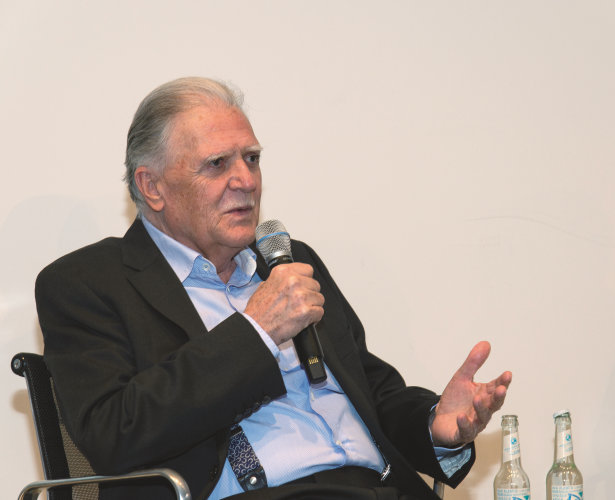Johannes Waltermann wins the Michael Ballhaus Award 2015

This award is sponsored by Osram to support newly graduated camera operators as they take their first steps in the film industry
This is the second year in which Osram, together with the Michael Ballhaus Foundation, Leica and Weberbank, is endowing the 10,000 euro Michael Ballhaus Award. The purpose of the award is to help newly graduated camera operators embark on a career in the film industry. Of the three nominations, Johannes Waltermann, who was behind the camera on “After Spring Comes Fall”, particularly impressed the jury especially with his skills.
First Steps is an award for newcomers to the German film and TV industry and is presented for outstanding graduation films from film schools in Germany, Austria and Switzerland. The Michael Ballhaus Award for Camerawork was presented in the Stage Theater at Potsdamer Platz as one of eight award categories under the First Steps program. The criteria on which judging was based included innovative imagery, exceptional cinematographic talent and unobtrusive visual handling of a filmic theme. “With its long tradition in the cinema and film industry, Osram is very keen to give active assistance to newcomers to the industry. The monetary aspect of the Michael Ballhaus Award will support the future projects of these talented youngsters”, said Hans-Joachim Schwabe, CEO of the Specialty Lighting Business Unit at Osram.
Michael Ballhaus Award for Camerawork
Last year at the first award ceremony, Julia Hönemann was declared the winner for her camerawork on the film “Porn Punk Poetry”. This year, three cameramen were nominated across all categories: in addition to the winner Johannes Waltermann (Film University of Babelsberg) with “After Spring Comes Fall” also Sebastian Thaler (Film Academy of Vienna) with the medium-length film “Alles wird gut” and Raphael Beinder (German Film and Television Academy of Berlin) with the documentary “Die Böhms – Architektur einer Familie”. Waltermann's camera work was impressive in a political film that used Berlin as its background. The jury stated that the young cameraman made clever use of the limited resources and that thanks to him those limitations were not obvious in the film. He avoids gimmicky effects and overblown visuals, working instead with light and movement.
An inspirational partnership
Cameraman Michael Ballhaus, who was recently awarded the Order of Merit of the Federal Republic of Germany, is firmly anchored in the film industry as one of the most famous representatives of his discipline, just like Osram – the expert in lighting and projection systems. Ballhaus, who has been working behind cameras for forty years, has made films with such renowned directors as Rainer Werner Fassbender, Martin Scorsese and Francis Ford Coppola. Osram has also been shaping the film industry over many decades. Osram technology is used to illuminate one in three cinema screens throughout the world and half of all film sets. Osram has twice received an Oscar for its innovative lighting solutions for the film industry.
ABOUT OSRAM
OSRAM of Munich, Germany is one of the two leading light manufacturers in the world. The company's portfolio covers the entire value chain from components – including lamps, electronic control gear and opto semiconductors such as light-emitting diodes (LED) – as well as luminaires, light management systems and lighting solutions. OSRAM has around 34,000 employees worldwide and generated revenue of more than €5.1 billion in fiscal 2014 (ended September 30). The company's business activities have been focusing on light – and hence on quality of life – for over 100 years. The company was listed on the stock exchanges in Frankfurt and Munich on July 8, 2013 (ISIN: DE000LED4000; WKN: LED 400; Trading symbol: OSR).
Additional information can be found at www.osram-group.com
DISCLAIMER
This document contains statements and information pertaining to our future business and financial performance and future developments that may constitute forward-looking statements – i.e. statements about processes that take place in the future, not in the past. These statements pertaining to the future can be identified by expressions such as "anticipate", "expect", "want", "intend", "plan", "believe", "aspire", "estimate", "will”, "predict" or words of similar meaning. Such statements are based on current expectations and certain assumptions of OSRAM‟s management. They are, therefore, subject to certain risks and uncertainties. A variety of factors, many of which are beyond OSRAM‟s control, affect OSRAM‟s operations, performance, business strategy and results and could cause the actual results, performance or achievements of OSRAM to be material different from any future results, performance or achievements that may be expressed or implied by such forward-looking statements or anticipated on the basis of historic trends. These factors include in particular, but are not limited to the matters described in the chapter “Report on Risks and Opportunities” in the Annual Report of OSRAM Licht Group. Should one or more of these risks or uncertainties materialize, or should underlying assumptions prove incorrect, actual results, performance or achievements of OSRAM may vary materially from those described in the relevant forward-looking statement as being expected, anticipated, intended, planned, believed, sought, estimated or projected. OSRAM neither intends, nor assumes any obligation, to update or revise these forward-looking statements in light of developments which differ from those anticipated. Due to rounding, numbers presented throughout this and other documents may not add up precisely to the totals provided and percentages may not precisely reflect the absolute figures they reference.